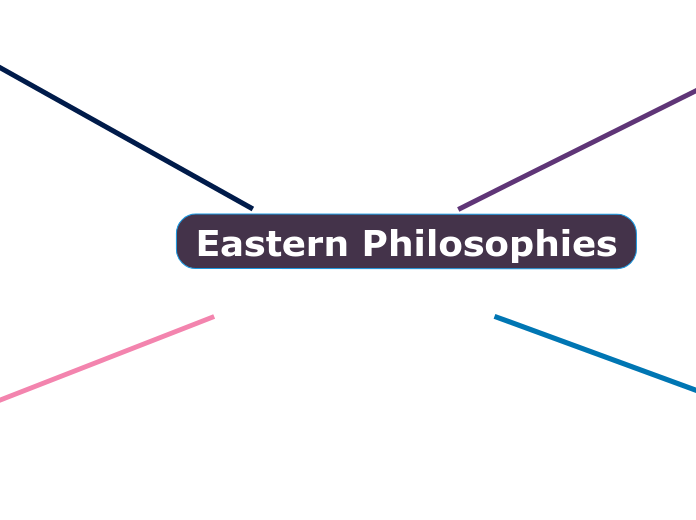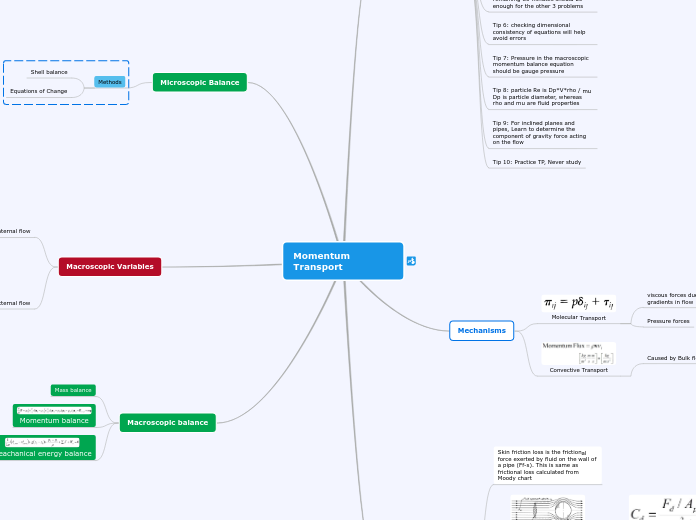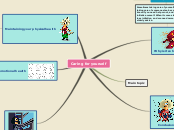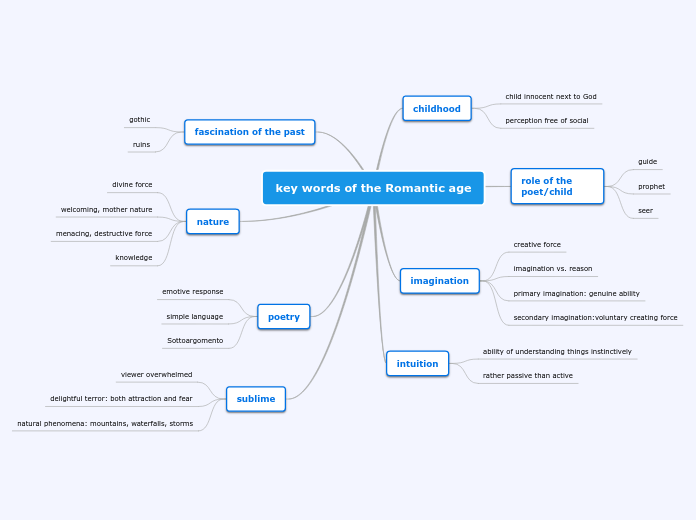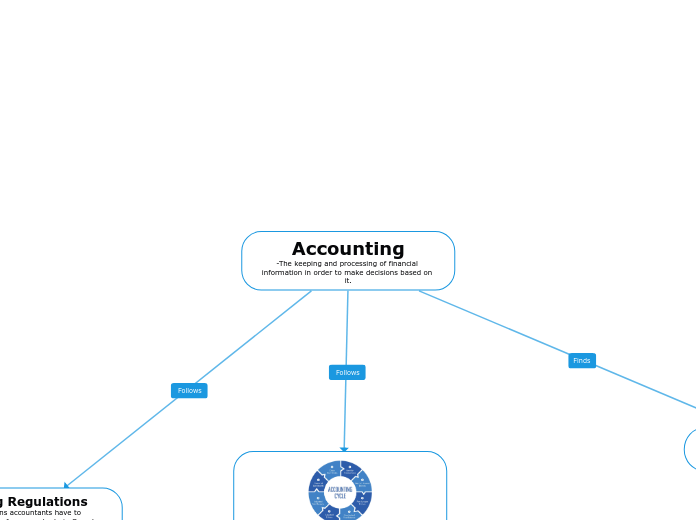Eastern Philosophies
Hinduism
Atma is equated to inner self or soul. It is the true self of an individual beyond identification with phenomena, the essence of an individual: in order to attain liberation (moksha), a human being must acquire self knowledge, which is to realize one’s true self is identical with the transcendent self Brahman.
In Hinduism, there are 4 goals that need to be achieved to complete life's purpose.
Moksha
The final meaning is Moksha and it is the hardest to conquer because it can take many generations and many lifetimes. In refers to enlightment and oneness with God. This is important because in offers liberation from reincarnation or rebirth and allows the person to unite with God.
Kama
The third meaning is to seek Kama; Kama refers enjoyment in life. Unlike other Eastern philosophies like Taoism which denies that one should seek joy and follow their desire, Hindu's have fun as one of their meanings in life.
Artha
The second meaning is to achieve wealth and richness in one's life. The richness can be achieved by any means but the person should stay in the boundaries of the Dharma and not cause harm on his journey to prosperity.
Dharma
The word Dharma means law, teaching and religion. For Hindu's, world means one's predetermined destiny. Most of the time it points towards one's vocation or job, which is usually influenced by class and family. This means, if a Hindu is a tea-maker, then his descendants will also become tea-makers. In addition, Dharma also represents the 5 debts, these are debts a Hindu is born with and must repay them throughout life. It is also known as karma or wrong doings.
5 Debts
Debt to guests; repaid by treating them as if they were gods visiting one's home
Debt to parents and teachers; paid by supporting them, having children of one's own and passing along knowledge
Debt to other human beings; repaid by treating them with respect
Debt to all other living beings; repaid by offering good will, food or any other help that is appropriate
Debt to the gods for their blessings; paid by rituals and offerings
One of Hinduism's key goals is to achieve spiritual union or alignment with Brahman (the inner power). Different groups of Hinduism focus on different characteristics of Brahman. The who different groups either focus on Nirguna or Saguna Brahman.
Saguna Brahman
In the Saguna form, Brahman has a name, form, identity, and purpose which may vary from time to time. Through this, the people get the ability to understand Brahman's many forms and how it manifests in reality. It allows the people to prey to statues and images, also known as "murtis" in Hindi.
Nirguna Brahman
This refers to Brahman as beyond time and space. It focuses on Brahman is having no form and living inside everyone. This allows mediators and gurus to focus on the inner form of Brahman or the soul to align with it and feel its power. Nirguna is unique as it allows others to focus on its eternal qualities than to get distracted by its many names and forms.
To Hindu's, there is no difference between mind and matter. They are both part of the same thing. One way that Hindu's believe in this connection is through yoga or meditation. Through meditation, they are clearing their bodies and reaching internal peace. This in return allows them to connect with Brahman and Atman. The Atman is the real self beyond the ego. It is often referred to as the soul or the spirit which is the true self underlying one's existence.
Two Aspects Of Brahman
Transcendent
In Brahmans transcendent form, it is void of name and form, sex, and any attributes. It is a formless being. Through its inscrutable power called Maya, it has the power to make anyone or anything believe in whatever, this is an illusion to everyone but not to Brahman.
Immanent
In its Immanent form, Brahman resides with everyone and any living creature. Its power can be felt through within when one aligns with the cosmos and nature. Immanence is an inner understanding the you are special without needing to hear it from someone. Self-recognition is one's personal value that reflects the light within someone. Immanent also points to the need for enlightenment by dissolving the ego and and attaching the mind with the inner-self that possesses the power. The power that can be felt inside because of the Brahman existing in everything.
In Hinduism, Brahman means God, but it also means ultimate reality. Sometimes it is referred as divine consciousness and that is because of how they define God. For Hindu's, Brahman is present through the entire universe and all living creatures carry some part of Brahman in them. Brahman is the nature of knowledge, enlightenment, power, absolute and the reason for all of existence, base of awareness, and source of bliss.
Taoism
Wu wei, non-action, to so orient oneself with the Tao that one's actions go unnoticed and beings that are wholly in harmony with the Tao behave in a completely natural, uncontrived way.
The Meaning of Life
To Attain Immortality By Some Means
Attainment Of Superhuman Physical Abilities
Focusing one's attention on the body through diet, exercise and mindfulness.
Longevity Of Life
Regulating the breath and circulating its energy throughout the body. Obtaining sexual energy by retaining semen and sending its power throughout the body.
Eternal Life
Searching for the Isles of the Blessed. This is where the immortals live and may be persuaded to tell their secrets to immortality.
Meaning in life for Taoists is simple in that they embrace the journey of life with full honor. The strive towards aligning themselves with the Tao through wu wei, which meaning without action, and letting nature and destiny take its course with interfering.
The connection between mind and body is very close in Taoism. Taoists believe that one must open their mind to the world around them and connect to it to be part of the world. One way to show the relationship between mind and body is Taoists master martial arts. By doing martial arts, ones breath becomes in sink with the physical body leading to harmony. Thus, leading to a balanced and fulfilling life.
Yin & Yang
Yin and yang symbolize the need for ultimate balance in ones life. It involves the discarding of unique and complex plans to escape the inevitable or the bad. Instead of trying to improve oneself through rigorous action, it is better understood as accepting the suffering of the world and welcoming it into one's life. This involves giving up ones desire or need for materialistic things and living life with flow or as water. It emphasizes that one should accept life as it is instead of preparing for it and trying to alter one's destiny. Attempting to change the future always leads to imbalance which leads to adverse effects and chaos.
Tao
Usually defined as the path or the route. Tao is seen as a way of life or the way of nature and ultimate reality. It flows through all life. A happy and joyful life is the one that is aligned with the Tao and Nature. For Taoism, Tao is the thing that unifies all of nature and the universe, and the one thing that exists. Tao existed before the universe and heaven were created. It is formless though complete in its way. Tao is the greatest mystery of mysteries.
Confucianism
The Confucian self is not a concept of an independent entity. In the process of self-development, the key is to relating to one's social commitment, rather than isolating oneself from others and society.
Junzi
The ideal man that can live with poverty; Junzi does more and speaks less. A Junzi is loyal, obedient and knowledgeable. Junzi disciplines himself. Among these, ren is the core of becoming Junzi. Ren is being courtesy, having breadth, good faith, diligence and clemency. Thus, being the perfect man morally.
Two of the most fundamental concepts that define Confucianism and what his followers throught as ultimate spiritual reality is the Dao and Heaven. In Confucianism, the Dao and Heaven are non-personal realities that have existed before the beginning of time.
Heaven
In Confucian philosophy, Heaven refers to the universe and when talking about Earth, the material and nature world. Confucians believe that Heaven is the source of all meaning and value. Heaven is usually stated as having its own Dao which governs and organizes the universe. Although the term Heaven is usually said to have different meanings in Confucian because of Confucius lack of meaning in his texts, it is often given two meanings. In the spiritual and heavenly world, it is understood as a supreme being who governs the material and human world. In nature, it is conceptualized to the Natural Law Theory. In any case, Heaven is known as the ultimate source of norm-activity.
The Dao
Early Confucian writings put emphasize on the immanent form of the Dao rather than the transcendent aspect. For example, followers of the Confucian philosophy say that the Dao is very close to human beings. Dao is therefore accessible and knowable but that does not mean it is not mysterious too. Confucius did not deny transcendent realities but he preferred to analyze reality from the ground up or from the matter that exists.
Confucianism unlike other eastern philosophies does not believe in the concept of afterlife as deeply. They place heavy emphasize on one's relationships with other people in there lifetime. People's character is formed through connections through parents, siblings, spouse, friends and social roles. Confucianisms need discipline to learn the ways of harmony and and success within their social relationships. The purpose of managing relationships is to then fulfill once role in society by being honest, politeness, filial piety, propriety, loyalty, humaneness, and benevolence in accordance with the order in the universe manifested by Heaven (also known as Tian). Like before, Confucian's don't dwell on the idea on afterlife. They do believe that even after death, the people are connected with their descendants in this world through rituals. The connection is because of there goodness and respect for parents, known as filial piety. Confucian's like to stay with the normal living world because like Confucius said, "We can realize the ultimate meaning of life in ordinary human existence."
The relationship between mind and matter to Confucian's is that they have to have the mind to carry to learn the virtues but also need the physical body to carry the virtues out. Confucian's also learn their virtues through the physical and natural world. The world around them provides the necessary experiences to learn about virtues. Once these virtues are held, they consider the virtues the guardians of the Heaven. A defender of the Heaven and all their creations on Earth. Thus, virtues, to them, at utmost important. Virtues protect the Heaven and the Earth world. This also means the relationship between mind and matter is interconnected and part of the same thing.
Buddhism
What Is The Self?
The five skandhas: The Buddha taught that an individual is a combination of five aggregates of existence
Consciousness: awareness of or sensitivity to an object, but without conceptualization
Mental Formations: includes habits, prejudices, mental states both virtuous and non virtuous, causes and effects of karma
Sensation: Made up of feelings, both emotional and physical, and our five senses
Form: our physical form
Perception: takes in what we call thinking-conceptualization, cognition, reasoning
The Meaning Of Life
In Buddhism, the primary purpose of life is to end all suffering. To Buddha, humans suffer because they strive for materialist things that do not provide ever lasting happiness. Everyone tries to grasp onto friends, health, material things, and wealth which do not last and that causes sorrow in life. Buddha not deny that things in life do give joy, but claimed that our attachment to them is the cause of the problem and the suffering. Buddhism focuses on the impermanence of all things and freeing oneself from suffering. Ending suffering will eventually lead to the ending of reincarnation. The truths are often expressed as The Four Noble Truths or the Noble Eight-fold Path.
The Four Noble Truths
There is a path that leads from dukkha. Although Buddha throws all the responsibility back at the individual and his/her mind for the cause of all suffering. He also provides a The Eight-fold path to change people's lives through actions they can take themselves.
The cessation of dukkha comes with the cessation of craving. Since humans are the cause of all suffering or of all dukkha, they are also the solution to everything. Humans cannot change their response to what happens around them but they can change how they react by controlling their mind.
The cause of dukkha is craving. Humans normally blame their difficulties on the things outside. To Buddha, the real cause exists in the mind as that is the reason for all desires. Particularly, our tendency to grasp for things places us at the odds for seeing the actual way of life.
All existence is dukkha. Dukkha means suffering. According to Buddha, everyone's life is filled with struggle, and people do not find ultimate happiness or satisfaction in anything they experience. This is a major problem in one's existence.
The Eight-fold Path
Right Concentration
Right Mindfulness
Right Effort
Right Livelihood
Right Action
Right Speech
Right Thought
Right Understanding
The Ultimate Nature Of Reality
Buddhism is unlike other traditions in that it has no Gods but is focused on human potential. Buddhism is centered on Dharma which is a key aspect of Hinduism. This makes sense because Buddhism was created by a man who was a Hindi before adopting to his own way of life. Dharma is focused on the ultimate truth; seeing things as they really are. Humans are deceived and fooled by the impermanent things around them. They thing the impermanent things make them happy, however Dharma is achieving enlightenment and seeing reality as it really is. Buddha means someone who has opened to the real truth. The truth is life that many normally experience is led by suffering and impermanence. We are born into the world because of selfish reasons. However, there is an alternate state known as nirvana which is free from suffering and oneness with the universe.
The Relationship Between Mind & Matter
According to Buddhism, life is a combination of both mind and matter. Mind consists of perceptions, sensations, consciousness, and volitional activities. Matter on the other hand consists of heat, motion, solidity, and fluidity. Life is the co-existence of mind and matter. Death is the lack of coordination of the mind with matter. Birth is the recombination of mind and matter. After passing away, the mind recombines and forms a new combination in a different material and create a new existence. Many do hold the view that life only originates from matter, but many have accepted that mind precedes matter in order for life to originate. Both the mind and matter rely on each other to function, and one could not survive without the other. It is like a battery in a car, the battery powers the car but the car recharges the battery. When the connection between the two separates, then the car cannot function. The connection between mind and matter is just like that in Buddhism.
